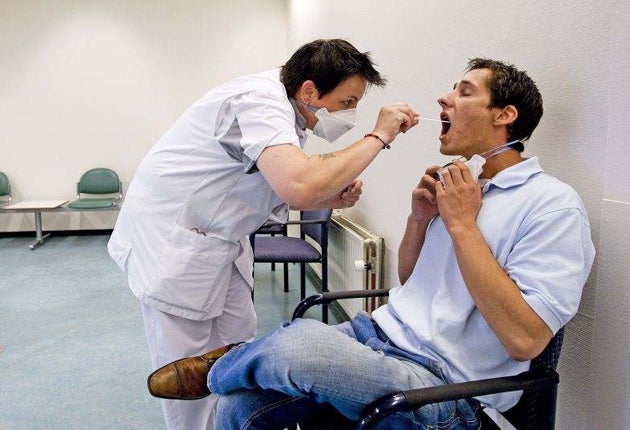Swine flu may have peaked, experts say

Your support helps us to tell the story
From reproductive rights to climate change to Big Tech, The Independent is on the ground when the story is developing. Whether it's investigating the financials of Elon Musk's pro-Trump PAC or producing our latest documentary, 'The A Word', which shines a light on the American women fighting for reproductive rights, we know how important it is to parse out the facts from the messaging.
At such a critical moment in US history, we need reporters on the ground. Your donation allows us to keep sending journalists to speak to both sides of the story.
The Independent is trusted by Americans across the entire political spectrum. And unlike many other quality news outlets, we choose not to lock Americans out of our reporting and analysis with paywalls. We believe quality journalism should be available to everyone, paid for by those who can afford it.
Your support makes all the difference.An expected second wave of pandemic influenza which was expected to strike Britain later this year may turn out to be less dangerous than previously thought, according to some of the world's leading flu experts.
Scientists are having second thoughts about whether they were right to expect a more lethal form of H1N1 swine flu virus to emerge this autumn following a re-evaluation of previous influenza pandemics.
A separate survey of the world's leading flu scientists has also found that the vast majority of experts do not think a nastier form of the virus is likely to emerge. They said the chances of a more virulent version of the H1N1 influenza A virus emerging when the winter flu season begins is 50/50 or less.
In a second study, two virologists reviewed the possibility of a more lethal second wave by looking at the known patterns of spread for the 14 or so previous influenza pandemics from that have occurred over the past 500 years. They found little evidence to support the likelihood of a second or third more lethal wave of H1N1 influenza.
However, most influenza experts emphasised that the flu virus is notoriously unpredictable and there is always a chance – however small – that the swine flu virus could mutate, with serious consequences for public health.
Fewer than 40 people with swine flu have died in Britain but tens of thousands are believed to have been infected. This relatively low mortality rate, combined with the mildness of the symptoms in most patients, has led to warnings that a second wave of the pandemic may actually be more deadly as a result of changes to the virus.
The idea was thought to be supported by evidence from the three previous flu pandemics of the 20th century but David Morens and Jeffery Taubenberger of the US National Institute of Allergy and Infectious Diseases have now questioned this in a study published in the Journal of the American Medical Association.
In the 1918 influenza pandemic, which is estimated to have killed 50 million people worldwide, there is little evidence to support the long-held idea that the outbreak started with a first wave of milder illness which superseded a second, more deadly wave when the virus mutated into a more transmissible and virulent form, they said.
A review of other pandemics, including those in 1957 and 1968 as well as earlier ones dating back to 1510, also failed to find convincing evidence to support the idea that viruses start out relatively mild before turning into more lethal mutants.
"With little consistent evidence of wave-line behaviour in the major influenza epidemics and pandemics of the past, there is a general tendency of pandemics to quickly assume annual seasonality in temperate zones," said Morens and Taubenberger.
"Considering the long and confusing track record of pandemic influenza, it is difficult to predict the future course of the present H1N1 pandemic," they added.
A survey of 60 leading flu specialists by New Scientist magazine has found that most of them believe that the chances of a more virulent version of the H1N1 virus emerging later this year is less than 50/50.
Laurence Tiley, a molecular virologist at the University of Cambridge, told the magazine that there was no reason to expect that the virus will become substantially more virulent.
Join our commenting forum
Join thought-provoking conversations, follow other Independent readers and see their replies
Comments